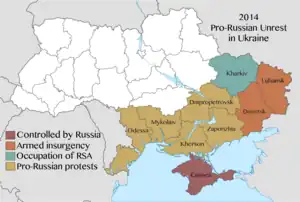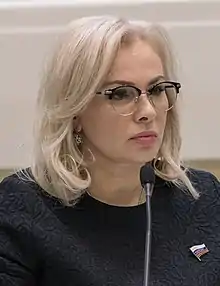Head of the Republic of Crimea
The Head of the Republic of Crimea is the highest official and the head of the executive power of the Republic of Crimea; an internationally disputed federal subject of the Russian Federation located on the Crimean Peninsula.[1]
| Head of the Republic of Crimea | |
|---|---|
| |
 | |
| Executive branch of the Republic of Crimea | |
| Style | |
| Type | |
| Residence | Simferopol |
| Nominator | President of the Russian Federation |
| Appointer | State Council |
| Term length | Five years, no more than two consecutive terms |
| Precursor | President of Crimea |
| Formation | 9 October 2014 |
| First holder | Sergey Aksyonov |
| Website | Official website |
| This article is part of a series on the politics and government of |
| Crimea |
|---|
 |
|
Autonomous Republic of Crimea (within Ukraine, 1991–present) |
|
|
Republic of Crimea (territory occupied by Russia 2014–present) |
| See also |
|
Political status of Crimea Politics of Russia • Politics of Ukraine |
Crimean Head's policy is to ensure compliance with the Constitution and federal laws and the Constitution and laws of the Republic of Crimea, as well as the equality of nations and the rights and freedoms of man and citizen, and the preservation of the coordinated functioning of state bodies of the Republic. Person under 30 cannot be a head of the Republic.
Term of office is five years. Appointed by the State Council of the Republic on nomination of President of the Russian Federation. Interim Head of the Republic is appointed directly by President.
The current Head of the Republic Sergey Aksyonov was elected in 2014 and re-elected in 2019.
History
Background
The Crimean Peninsula, historically part of Imperial Russia and later an Autonomous Soviet Socialist Republic, was ceded in 1954 to Ukraine, which administered it until the political-military crisis of 2014.
Ukrainian President of Crimea
Under Ukrainian rule, an equivalent post, named President of the Republic of Crimea (Russian: Президент Республики Крым, romanized: Prezident Respubliki Krym), was provided by the 1992 Constitution of the Autonomous Republic of Crimea (de facto a special statute), with jurisdiction over the autonomous city of Sevastopol too.[2] The first presidential elections took place in 1994, won by the pro-Russian separatist Yuriy Meshkov (leader of a coalition named "Russia"), but on 17 March 1995 the Ukrainian parliament, as part of a wider process of reduction of the Crimean autonomy, abolished both the statute and the post of President of Crimea.[2]
From Ukraine to the Russian Federation

In the aftermath of the 2014 Ukrainian revolution led by pro-European nationalists hostile to Russia, the rise of pro-Russian protests in Ukraine led to the so-called Crimean crisis, parallel to the outbreak of the war in Donbass. On 6 March 2014, the authorities of the autonomous republic of Crimea, emulated the next day by the authorities of Sevastopol, unilaterally declared independence from Ukraine, formalizing it jointly with a request to join the Russian Federation on March 11.[3][4][5] On March 17, following a joint status referendum held on March 16, the Supreme Council of Crimea and Sevastopol City Council confirmed the independence of the newly unified Republic of Crimea from Ukraine and the popular will to join Russia.[6] On the same day, Russia recognized the Republic of Crimea as a sovereign state.[7][8][9]

On March 18, the Crimean authorities finally signed the accession treaty to the Russian Federation, thus forming the Crimean Federal District, subsequently merged into the Southern Federal District.[10][11]
On April 11, the State Council of the Republic of Crimea consequently ratified a new constitution, providing for the post of Head of the Republic of Crimea, effective from April 14 of the same year.[lower-alpha 1]
Eligibility and authorities
Under article 62 of the Constitution of the Republic of Crimea, approved by the State Council on 11 April 2014 and entered into force the following day, any Russian citizen who has reached the age of thirty can take up the post, provided that he has not been subjected to restrictions on civil and political rights.
Formally a head of state, the head of the republic is actually a governor, subordinate to the president of the Russian Federation; he oversees the executive, and has the right to legislative initiative in the State Council, which he can also convene exceptionally.
Furthermore, under articles 61-65 of the Constitution, he:
- appoints and dismisses, with the consent of the State Council, the Chairman of the Council of Ministers, without prejudice to the possibility of simultaneously holding both posts, as well as the ministers and other senior officials of the Republic;
- represents the Republic of Crimea in relations with the central government and other local authorities of the Russian Federation, as well as with foreign economic representatives; and signs treaties in the name of the Republic;
- signs and promulgates the laws of the Republic of Crimea; and adopts presidential decrees.
Presidential appointed officials
- Prosecutor General: Natalia Poklonskaya, appointed by Sergey Aksyonov on 11 March 2014[lower-alpha 1] (although the right of appointment has passed to the Prosecutor General of the Russian Federation, her mandate was confirmed ad interim on March 25 and definitively on 2 May 2014 by Yury Chaika, ending on 6 October 2016);
- Representative to the Federation Council: Olga Kovitidi, appointed by Sergey Aksyonov on 15 April 2014;
- Prime Minister: Yury Gotsanyuk, appointed by Sergey Aksyonov on 20 September 2019.
.jpg.webp) Natalia Vladimirovna Poklonskaya
Natalia Vladimirovna Poklonskaya Olga Fyodorovna Kovitidi
Olga Fyodorovna Kovitidi.jpg.webp) Yury Mikhailovich Gotsanyuk
Yury Mikhailovich Gotsanyuk
List
| No. | Portrait | Name | Political party | Election | Term of office | Prime minister(s) | Ref. | |||
|---|---|---|---|---|---|---|---|---|---|---|
| Took office | Left office | Time in office | ||||||||
| 1 | .jpg.webp) |
Sergey Aksyonov November 26, 1972 |
United Russia | —[lower-alpha 2] | 14 April 2014[lower-alpha 1] | 9 October 2014 | 178 days | Himself | ||
| 2014 | 9 October 2014 | 19 September 2019 | 4 years, 345 days | |||||||
| 2019 | 20 September 2019 | Incumbent | 4 years, 36 days | Yury Gotsanyuk | ||||||
Elections
2014
Three candidates were nominated for the election:[12]
- Sergey Aksyonov, interim Head of the Republic;
- Gennady Naraev, Minister of Ecology and Natural Resources of Crimea;
- Alexander Terentyev, Deputy of the State Duma.
| Candidate | Party | Votes | % | |
|---|---|---|---|---|
| Sergey Aksyonov | United Russia | 75 | 100 | |
| Gennady Narayev | United Russia | 0 | 0 | |
| Alexander Terentyev | A Just Russia | 0 | 0 | |
| Total | 75 | 100 | ||
| Source:ТАСС | ||||
2019
_03.jpg.webp)
Three candidates were nominated for the election:[13]
- Sergey Aksyonov, incumbent Head of the Republic;
- Pavel Shperov, Deputy of the State Duma;
- Sergey Bogatyrenko, Deputy of the State Council of Crimea.
| Candidate | Party | Votes | % | |
|---|---|---|---|---|
| Sergey Aksyonov | United Russia | 74 | 98.7 | |
| Pavel Shperov | Liberal Democratic Party | 0 | 0 | |
| Sergey Bogatyrenko | Communist Party | 0 | 0 | |
| Total | 75 | 100 | ||
| Source:ТАСС | ||||
Notes
- The transition from the Ukrainian to the Russian administration lasted a week, from 11 to 18 March 2014. In those days, although formally it was still part of Ukraine, the Crimean government already legislated autonomously, with acts recognized by the Russian Federation, but not Ukraine. Sergey Aksyonov, the last president of the Ukrainian Council of Ministers of Crimea, continued to exercise his role as interim head of government until April 14, and then governed as interim head of state until the elections held on 9 October 2014, in which his mandate was confirmed.
- Appointed by the President of the Russian Federation as interim Head of Republic.
References
- "Crimea profile". BBC News. 17 January 2018. Retrieved 11 September 2021.
- Eastern Europe, Russia and Central Asia 2004 (4th ed.). Taylor & Francis Group. 2003. p. 540. ISBN 978-1-85743-187-2. Retrieved 11 September 2021.
- "Crimea's Parliament Decides to Secede to Russia". RIA Novosti. 6 March 2014. Retrieved 11 September 2021.
- "Ukraine Crisis Deepens as Sevastopol Votes to Join Russia". RIA Novosti. 7 March 2014. Retrieved 11 September 2021.
- "Crimea". Enciclopedia Treccani (in Italian). Retrieved 11 September 2021.
- "Crimean parliament formally applies to join Russia". BBC. 17 March 2014. Retrieved 11 September 2021.
- "Executive Order on recognising Republic of Crimea". en.kremlin.ru. 17 March 2014. Archived from the original on 8 May 2015. Retrieved 11 September 2021.
- "U.S., EU set sanctions as Putin recognizes Crimea "sovereignty"". Reuters. 17 March 2017. Retrieved 11 September 2021.
- "Putin Recognizes Crimea Secession, Defying the West". The New York Times. 17 March 2014. Retrieved 11 September 2021.
- "В России создан Крымский федеральный округ" (in Russian). RBC. 21 March 2014. Archived from the original on 22 March 2014. Retrieved 11 September 2021.
- "Putin integrates Crimea into Russia's southern federal district". Russian News Agency TASS. 28 July 2016. Retrieved 11 September 2021.
- "Путин внес три кандидатуры на пост главы Республики Крым" (in Russian). Retrieved 11 September 2021.
- "Выборы главы Крыма пройдут 20 сентября" (in Russian). Retrieved 11 September 2021.
External links
- "Russian Administrative divisions". Retrieved 11 September 2021.
- 2014 Constitution of the Republic of Crimea (in Russian)
- "1999 Federal Law "On common principles of organisation of legislative (representative) and executive bodies of federal subjects of the Russian Federation"" (in Russian). Retrieved 11 September 2021.